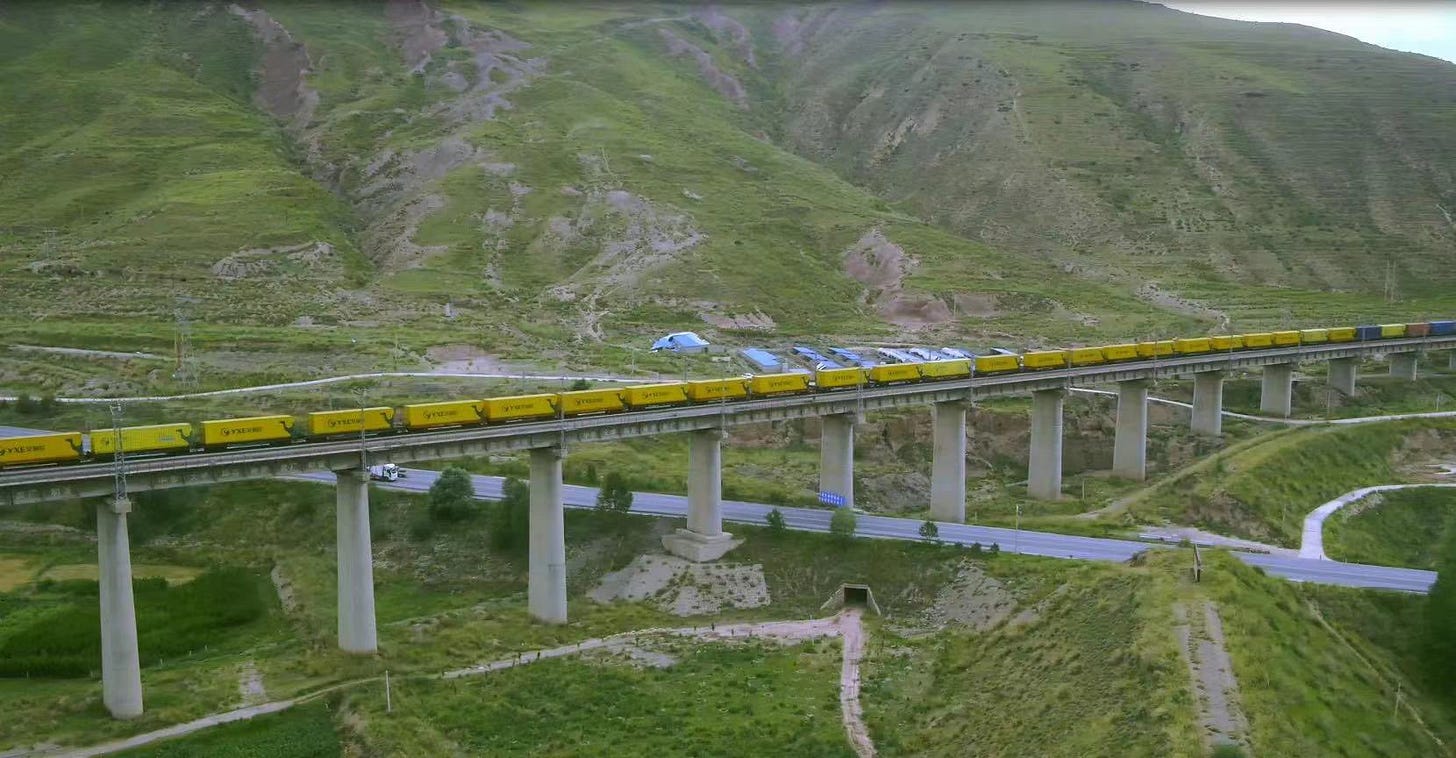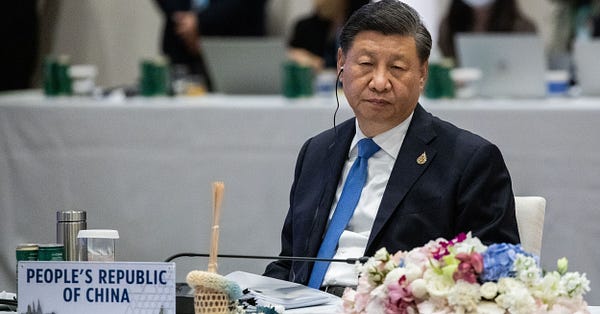Why China's recalibrating the Belt and Road Initiative
Beijing's goal—to achieve global dominance through its trade and investments—hasn’t changed. It’s just changed tactics.
By Vivek Y. Kelkar
In mid-January, China’s new foreign minister, Qin Gang, visited Angola, Benin, Ethiopia, Egypt, and Gabon. Some of these countries, like Angola, host Belt-and-Road investments; others are targets for investment. All are strategically significant: Angola, for example, is blessed with lucrative ores for semiconductors and batteries, whereas Egypt enjoys a highly strategic location.
In Ethiopia, the stakes are high. More than 400 Chinese companies, most focused on energy and infrastructure, are in Ethiopia. Ethiopia’s debt to China is reckoned to be about US$14 billion. It can’t be repaid. It must be restructured. Ominously, an accord signed in March 2021 gave China policing and law enforcement rights in Ethiopia, purportedly to protect China’s infrastructure and personnel. Ethiopians have noted, some with dismay, how much power this agreement gives Beijing.
China’s investments in Ethiopia are characteristic of its investments in Africa, and indeed of their Belt-and-Road investments around the world. Since 2013, BRI investments have mostly been in infrastructure and energy; typically, they’re projects with a long gestation, and often, low single-digit returns. China carefully chose these targets, focusing on Africa and the geopolitically significant nation-states of Asia, like Pakistan and Sri Lanka. Beijing believed these investments were critical to its quest to become a global power.
Beijing views the world order as a system with multiple nodes—nation-states, trade centers, companies, and institutional and non-institutional actors. To influence and mold global institutions and networks, China uses infrastructure development to shape the nodes of the system. This, in Beijing’s view, is the key to combatting the United States’ dominance of the global order.
The BRI’s pitfalls
China’s BRI investments are meant to create networks of relationships and dependencies that shape trade flows, geoeconomics, and geopolitics to China’s advantage; Beijing means to influence and direct this Sino-centric system through its network effects.
China is estimated to have spent around US$972 billion on the BRI since 2013. In theory, China’s state-owned banks bankroll the projects, its companies execute them, and its workmen build and manage them. If recipient states can’t repay their loans, China steps in to take over the projects: This gives China influence and leverage over that state, because effectively, Beijing now owns it.
In practice, this hasn’t quite worked as planned. The economy, and in countries like Pakistan, the politics, haven’t cooperated.
As an investment, the problem with infrastructure is chronically low returns. It’s also highly dependent on simultaneous industrial development: To make an infrastructure investment remunerative, you need trucks traversing toll roads, goods coming and going via ports. Income streams need to be sufficient to service debts and build profits.
Africa’s fundamental economics don’t favor big investments in infrastructure. China’s investments, admittedly, gave rise to an infrastructure boom on the continent. But because there’s been so little all-around economic growth, most of its projects are now foundering in a sea of debt. The toll roads and ports in Kenya and other African countries can’t earn their keep. Zambia and Ghana have already defaulted on their debts. Low-income countries are now asking themselves if these massive projects are a good deal: They create debt and become targets for local opposition. High interest rates, sinking currencies, and current account deficits add to the damage.
Asia hasn’t been very different. Sri Lanka has effectively declared bankruptcy. Its Hambantota port is now in Chinese hands. China’s navy may have gained an advantage in Sri Lanka, but its banks can’t get their money back.
Pakistan is on the verge of bankruptcy. Its domestic politics have taken a violent turn. Rebels in Balochistan and Sindh provinces have targeted China so persistently that earlier this week, Beijing was forced to shut down its consulate in Karachi. The US$64 billion China-Pakistan Economic Corridor is vital to both countries’ interests, but barely half of its projects are finished. The deep sea Gwadar Port, despite its strategic position at the mouth of the Persian Gulf, has failed to bring business. The IMF has demanded more transparency from China about its loans to Pakistan, and told Beijing to be prepared to take a haircut.
Domestic economic pressure
China has extended loans, for example in Pakistan, where this has kept the country afloat. It’s a tactic called “extend and pretend” in banking circles. Beijing can either roll over debt or forgive it. Neither option is exactly palatable.
The reason? China’s domestic economic engine has begun to sputter, thanks to Xi Jinping’s rigid Covid policies and the global backlash China is facing. China’s economy has been heavily dependent on investment, which in turn must be funded by a constant flow of fresh credit. According to the Rhodium Group, investment makes up some 42 percent of China’s GDP, a far bigger proportion than in other economies at China’s stage of development. Credit growth, post-Covid, is slowing down. The Rhodium Group predicts that China’s financial system will be unable to generate high levels of credit growth; its credit supply is constrained by the size of the system and the burden of complying with capital requirement and loan loss provision regulations.
This puts pressure on China’s overseas infrastructure investments. If cash flows from low-return infrastructure projects aren’t regular, or simply don’t accrue, state-owned banks will be in trouble. A slowdown in domestic credit growth means shrunken pools of capital for financing overseas projects.
If China’s economy is to be given fresh momentum, then short-gestation, high cashflow projects must be prioritized, domestically and overseas. This is even more true given China’s competition with the US in frontier technologies such as semiconductors and artificial intelligence, and the new Biden policies that effectively bar key American allies from investing in these sectors in China.
Domestic investment in technology and R&D will necessarily require considerable sums of money. Domestic investment in China will take priority over overseas investment in long-gestation infrastructure projects. Domestic priorities could crowd out overseas BRI infrastructure investment.

The recalibration
China is therefore recalibrating its BRI strategy. Chinese bankers are aware of these problems. Beijing negotiated with Uganda for two years on an agreement to build a 273-kilometer highway linking Uganda’s capital, Kampala, to Mombasa in Kenya. Last month, China quietly gave up. Its bankers concluded the project wasn’t viable. Turkey stepped into the breach. A Turkish company, Yapı Merkezi, won the contract.
African countries are wising up, too. In July last year, Zambia canceled US$1.6 billion in Chinese loans, most of which were earmarked for road and telecom projects. The cancellation was quickly followed by a successful US$1.4 billion bailout from the International Monetary Fund. Meanwhile, Kenya’s Standard Gauge Railway from Nairobi to Mombasa—built with Chinese funds—faces losses over a three-year period upward of US$200 million, suspension, and closure.
These aren’t isolated incidents. In 2022, overall BRI investment dropped in 14 countries, according to a report from the Green Finance & Development Center of the Fanhai International School of Finance at Fudan University, Shanghai. These included Peru, Sri Lanka, and several in Africa.
The report highlighted the change in direction of China’s overseas investment, from infrastructure to other industries that could generate strong cash flows. The Fudan University report also noted that the average size of a Chinese construction deal was now smaller than it had been since 2013, having dropped from US$600 million to US$330 million. The authors noted that China’s engagement with sub-Saharan Africa and West Asia had dropped to their lowest levels, but Arab and Middle Eastern countries had attracted more Chinese interest. Hungary, Saudi Arabia, and Singapore were the largest investment beneficiaries; the main beneficiaries of Chinese construction investment, meanwhile, were the Philippines and Argentina.
Projects tied to the existing advantages of China’s economic engine are now the order of the day. Some involve infrastructure, most don’t. Southeast Asia, Russia, Central Asia, and Latin America are now China’s focus. Last year in Hungary, China’s Contemporary Amperex Technology Ltd., a semiconductor and battery giant, signed a contract to build a US$7.8 billion battery plant. This shows how much BRI tactics have changed, even as the overall global strategy remains the same—to create direct growth and build network effects while affording Beijing a measure of control through capital, technology, and supply chains.
In this new version of the BRI, Central Asian infrastructure projects, like road and rail works, are preferred because they tie into the existing rail connectivity between Europe and China. The China-Europe freight trains through Russia and Central Asia transported nearly 1.6 million TEUs (twenty-foot equivalent units) last year, so new routes serve to buttress the existing lines through Russia and offer considerable regional trade benefits.
Investments in Latin America are directed toward fossil fuel and mining assets that offer lucrative cash flows. Take, for instance, China’s joint ventures in Argentina, Chile, and Bolivia—the so-called lithium triangle. The bid to control this lithium, needed to power batteries for electric vehicles and green energy storage, is a major gambit in the American hemisphere. Lithium feeds China’s battery industry, nearly 50 percent of the world’s supply. CATL, for instance, is heavily involved in Bolivia and makes nearly 35 percent of the world’s lithium-ion batteries. Meanwhile, Oman, Saudi Arabia, the UAE, and other West Asian states are not only economically sound, they’re willing and able to invest reciprocally and offer immediate trade benefits.
Asia and Russia
Southeast Asia, in particular, offers the lure of new overland and sea routes that can be linked directly to industrial investment and trade. The International Land-Sea Trade Corridor in Southeast Asia includes the Laos China highway, now under construction, which will link Cambodia’s Golden Port Expressway (financed and built by China) and the Jakarta-Bandung high-speed railway. This will be a lucrative new route for goods from fast-growing economies such as Indonesia and Malaysia. China says that nearly 750,000 TEUs of goods have already been transported this way over the past year.
Financing Central Asia’s infrastructure appears to be helpful to China. In recent years, Beijing has also been quietly investing in Russia’s east coast and the Arctic. The Power of Siberia 2 pipeline allows Russia and China to co-invest in adjacent industries such as petrochemicals. China is now investing heavily in SIBUR, Russia’s largest integrated petrochemical company, in Eastern Siberia’s Buryatia. Investing in infrastructure in eastern Siberia helps boost Russia-China trade, of course, and ensures there’s enough traffic on the roads and railroads to justify the cost.
China is making fresh investments in roads and bridges along and over the Amur River, which borders Russia’s Far East and China. Joint ventures in the Arctic, both in mining and ore refining, take advantage of the new overland routes across Siberia and China’s eastern seaports. Last year, China announced a new joint venture with Russia Titanium Resources to mine the massive titanium deposits in the Arctic.
China’s goal—to achieve global dominance through its trade and investments—hasn’t changed. It’s just changed tactics. China now prefers investments that mature rapidly and offer it the geographic advantage. The strategy is still meant to create dependencies centered around Beijing. The acquisition of direct or indirect control over advantageous trade routes, minerals, and fossil fuels is still China’s strategy for changing the dynamics of the world order.
The US and other powers who prefer the status quo will need to focus, collectively, on not only on conventional defense but on economic defense if they’re to keep China from succeeding.
Vivek Y. Kelkar is the co-founder of the Cosmopolitan Globalist.
Further reading:
The Rhodium Group: The end of China’s magical credit machine. China’s economic growth will slow significantly over the next decade. One of the most important drivers of this slowdown is the unwinding of an unprecedented credit bubble.
China Belt and Road Initiative Investment Report 2022, by The Green Finance & Development Center.
Economically stressed China stops funding big projects in Africa. Rather, it is focusing on smaller projects as they do not involve greater financial risks nor they become an issue of hyper political debates and consequent public scrutiny.
China’s Belt and Road Initiative in the East African community: Shaping a China-centric regional order.
Belt & Road: Opportunity & Risk. Baker McKenzie on the prospects and perils of building China’s New Silk Road.


Wang Yiwei: The Digital Silk Road promotes a new type of globalization. Wang is the associate dean of the Academy of Xi Jinping Thought on Socialism with Chinese Characteristics for A New Era at Renmin University of China, and a senior fellow at the Chongyang Institute for Financial Studies.
Rising emerging market debt and geopolitical tensions hurt China’s BRI ambitions in Emerging Europe. China is struggling to make headway with the its Belt and Road Initiative in Africa, Europe and other parts of the world as EU countries increasingly place regulatory obstacles on Chinese investment, while emerging markets are strapped for cash and face growing debt burdens.
The response to debt distress in Africa and the role of China. Exploring solutions to African debt distress through multilateral cooperation.
Revitalizing INSTC: Analyzing geopolitical realignments and the China factor.
Iran welcomes the Belt and Road Initiative proposed by China and stands ready to work with China to safeguard world peace and facilitate global development, Iranian President Ebrahim Raisi said on Wednesday. Raisi made the remarks during a speech at Peking University, where he received the title of honorary professor.1
Chinese are no longer willing to work on Iran’s oil projects.
Belt and Road to nowhere. While negotiation with China on financing modality is possible, we are yet to see if it addresses our concerns.
The Asia Society Policy Institute’s digital toolkit for the navigation of Belt and Road Initiative infrastructure projects aims to set forth actionable recommendations for how China and partner countries can ensure that BRI projects yield beneficial outcomes.
China-Kyrgyzstan-Uzbekistan railway comes back to life. But major challenges to the project remain.
China and Central Asian countries sign BRI cooperation agreement.
China’s Belt and Road to nowhere. Xi Jinping’s signature foreign policy is a “shadow of its former self.” Beijing now appears to be recalibrating its approach, softening its rhetoric around the BRI’s capabilities, focusing on smaller projects, and shifting course to offering debt-ridden countries emergency loans.
The Belt and Road Initiative and the Partnership for Global Infrastructure and Investment: Global infrastructure initiatives in comparison.
China hasn’t given up on the Belt and Road. Beijing’s development aid plan is less flashy—but no less ambitious:
The United States and its industrialized partners will have to contend with a shifting paradigm of Chinese influence—one that is moving away from infrastructure megaprojects toward more diffuse, more sustainable engagement. And both groups will need to work together to address the legacy of Beijing’s lending spree, which has fueled corruption, encouraged antidemocratic practices, and saddled recipient states with enormous debts.


Use/misuse of Chinese BRI investment? BRI-related crony capitalism in Turkey.
IntelBrief: China’s South Asia troubles. BRI debts are creating problems for Beijing with its historic security partner, Pakistan, feeding into India’s assertions that China has imposed unsustainable financial conditions on recipients of BRI investments.
China Railway pays US$600 million for another stretch of Chile’s main highway.
Latin America is now China’s “backyard.” Excluding Mexico, China is the region’s largest trade partner. In 1981, Cuba was the only Latin American country trading more with China than the US.


Full throttle in neutral: China’s new security architecture for the Middle East. China has been fortifying its strategic ties and expanding its cooperation by heavily investing in local Belt and Road Initiative projects, as well as the infrastructure and technologies of the future. In doing so, it seeks to further integrate each nation’s development strategy with its own.
A World Divided: Russia, China and the West:
China is now ahead in the developing world. For the first time ever, slightly more people in developing countries (62 percent) are favorable towards China than towards the United States (61 percent). This is especially so among the 4.6 billion people living in countries supported by the Belt and Road Initiative, among whom almost two-thirds hold a positive view of China, compared to just a quarter (27 percent) in non-participating countries.
European Bank for Reconstruction and Development:
What China’s “Belt and Road Initiative” means for the Western Balkans
Belarus: Comparative Research on Industrial Parks and Special Economic Zones
A proactive and steady approach for the building of the China-Belarus Industrial Park
“China’s Belt and Road Initiative puts Paris climate commitments at risk” (FT’s beyondbrics)
Senate Foreign Relations Committee Majority staff report: US should bolster ties with allies, including India, to confront China’s “aggressive behavior” and compete with Beijing’s growing influence in the Indo-Pacific.
If you need a refresher on Raisi, David Patrikarikos has written the definitive article: A Malign Embrace: Ebrahim Raisi and Iran.









“China is making fresh investments in roads and bridges along and over the Amur River, which borders Russia’s Far East and China.” (Vivek Kelkar)
For a fascinating description of the economic and cultural realities of this part of the world see,
https://www.amazon.com/gp/aw/d/B08THNXPKZ/ref=tmm_kin_swatch_0?ie=UTF8&qid=&sr=
The author, Colin Thubron, is the greatest living British travel writer. At the age of 80 he took what turned out to be a perilous journey along the full length of the Amur River. One thing the book describes is the increasing resentment on the Russian side of the river of the economic dominance and even imperialism of their Chinese neighbors.
The book is at the top of the list of books I read in 2022 (it was published in 2021). A book review from the New York Times can be found here,
https://www.nytimes.com/2021/09/24/books/review/the-amur-river-colin-thubron.html